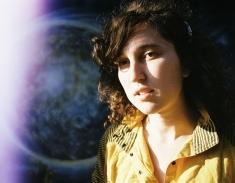With a distinctive earth-shattering vocal range (think Sleater Kinney’s Corin Tucker meets Karen Dalton), political-minded and queer-centric songs, and a sweet but tough persona, Toronto’s Emma McKenna is the ultimate rebel girl.
“I was inspired by the riot girl movement because I wanted to fuse art with feminism,” says McKenna. “I thought music could be an effective public medium through which to express myself.
“When I started out playing music I was really angry about things, about being a girl and gay and poor, and starting a girl band and learning to play an instrument and to use my voice were ways of resisting and responding to these conditions.”
After shifting gears from performing Galaxy to a solo career, not to mention finishing her degree in women and queer studies, McKenna feels things have changed. She’s still pissed off, but her approach is different.
“I think that right now music is my sadness; it’s where I can let out my fear and disappointment,” she says. “But it’s always undercut by the fact that I am out there, performing it as a lesbian. The performance aspect of the music allows me to create distance from as well as gain control over the feelings that I have experienced.”
Currently McKenna is in the midst of recording her forthcoming album, The Bad in Me, with Obijou’s Heather Kirby. She attributes the album’s title, The Bad in Me, as the first song she wrote on her own — post-band break up and the simultaneous end of a long term love affair.
“The song itself is really instrumentally sparse, and vocally marked a big transition in how I had been approaching singing,” she says. “It was the first time I began to sing not as an outward projection, like I had in Galaxy, but with more inward focus and sensitivity.
“Thematically, the line in the song goes ‘the bad that they see/ is just the bad in me’ and it goes on from there to a rising round of ‘they won’t get to me.’ For me, the phrase embodies a struggle within me over dark and light. It’s both a challenge and an acceptance, a conflict and a reconciliation.”
When everything came crashing around her McKenna rebuilt herself through art. She took a break from Toronto and headed to Halifax last summer, teaming up with like-minded women, queers and artists.
“I feel really fortunate to have some good music/art/performance friends in both indie and queer scenes,” she says. “I think my brief move to Halifax last year put me in touch with a bunch of artists — some who have since moved here — which helped to deepen my sense of where my own music is going.
“Toronto can be very alienating and it helps to have friends in multiple networks and different places. Another thing is that the west-end queer community functions as a site of queer art and performances of all genres, and I have found both enduring support and inspiration there.”
Emma McKenna.
emmamckenna.com
myspace.com/emmamckenna

 Why you can trust Xtra
Why you can trust Xtra


